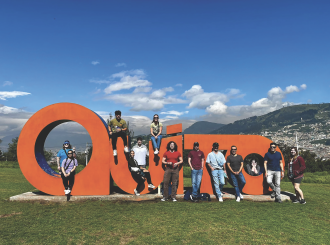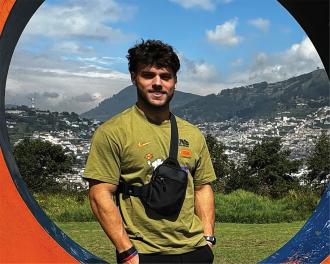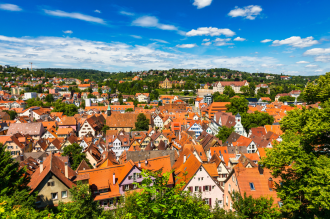Language immersion through study abroad at WMU
KALAMAZOO, Mich.—For students studying languages at Western Michigan University, studying abroad is more than just a change of scenery – it's a transformative experience that deepens language proficiency, enhances cultural understanding, and provides students with new global perspectives that last long after returning home.
Each year, hundreds of WMU students take part in study abroad programs across the world. Whether it’s a faculty-led trip or an exchange program at a partner university, these opportunities span dozens of countries on nearly every continent.
While studying abroad is beneficial for any student, it is especially vital for those who are learning another language. These immersive programs help students master language skills through real experiences that bring their coursework to life.
The Department of Spanish offers four study abroad programs, one during each semester and summer session, giving students the opportunity to travel and study in Ecuador, Spain (Burgos and Santander) and Costa Rica.
Of the programs the Department of Spanish offers, one popular option is in in Quito, Ecuador.
Students participating in the Quito program arrive in the South American nation with a WMU professor who helps students orient themselves with the partner school, Universidad San Francisco de Quito, before they move in with host families and begin coursework. Beyond the classroom, students learn about Ecuadorian culture through experiences such as a day-long city tour and travel to a local town and market.
“We believe that any study abroad experience is transformative, but even more so a language program such as ours, where students are encouraged to experience the culture and the language as much as possible and take their learning far beyond the courses taken at the host university," says Dr. Germán Zárate-Sández, professor of Spanish at WMU.
“Several students develop close relationships with their host families,” he says. "It's not uncommon for our students to get invited to family reunions, celebrations and trips, affording them the chance to get a first-hand experience of Ecuadorians’ daily lives while improving on their Spanish skills in real-life and diverse communicative contexts.”
One student who participated in this experience was Simon Wilke, a 21-year-old from Mattawan, Michigan, pursuing a double major in Spanish and accounting. He embarked on a two-month Spanish study abroad program in Quito, Ecuador in Summer 2024. The experience was so moving that Wilke returned to his host family as an independent traveler the following winter break.
“I will probably be going back there for the rest of my life,” he says. “Before that trip, I had never been outside the country.”
The Department of World Languages and Literatures also offers 15 study abroad programs in five countries, says Dr. David Kutzko, chair of the Department of World Languages and Literatures. “We have diverse study abroad options for all of the spoken languages in our department, which include Arabic, Chinese, French, German and Japanese.”
While not all study abroad experiences offered by the department are limited to those with a major or minor, language immersion is at the heart of many programs. These language immersion experiences include opportunities in Jordan (Amman), Hangzhou and Beijing), France (Besançon and Lyon), Germany (Berlin and Tübingen) and Japan (Tokyo, Kyoto, Otaru, and Hikone).
One immersive language opportunity takes place in Tübingen, a historic town in southern Germany, where WMU students study at the Karls-Eberhard University of Tübingen.
“The students are immersed in language courses and culture courses with professional instruction at the university level. Students are also immersed in daily life in Tubingnen. They live in student housing and live among the locals. By the time they return to WMU, their German language skills are excellent,” Professor of German Dr. Olivia Gabor-Peirce says.
“The students also grow through culture courses they take at the university, where they learn about various aspects of the German culture, as well as intrinsic characteristics of the regional culture in Tubingen, some examples include customs, traditions, dialect, cuisine and student life.”
Whether students are studying German, another language, or in an entirely different field, studying abroad offers invaluable opportunities for personal and professional growth.
“They return with a broader, more global understanding of the world and grow tremendously in terms of independence and self-discovery,” Gabor-Peirce says. “Students consistently return with a global network of relationships, they gain wisdom and experience beyond their immediate circle, it increases self-awareness and independence and opens minds to diverse perspectives.”
International Education Week 2025: November 3-7
Western Michigan University’s Haenicke Institute for Global Education announces International Education Week 2025. Join us as we celebrate global diversity and explore cross-cultural connections through guest lectures, panel discussions, research presentations and more. Several events are scheduled from November 3-7. All are open to the public. For more information, visit https://wmich.edu/global/events/international-education-week
For more WMU news, arts and events, visit WMU News online.




